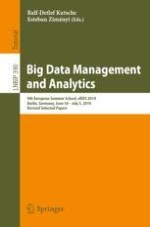2020 | Buch
Big Data Management and Analytics
9th European Summer School, eBISS 2019, Berlin, Germany, June 30 – July 5, 2019, Revised Selected Papers
herausgegeben von: Ralf-Detlef Kutsche, Esteban Zimányi
Verlag: Springer International Publishing
Buchreihe : Lecture Notes in Business Information Processing
